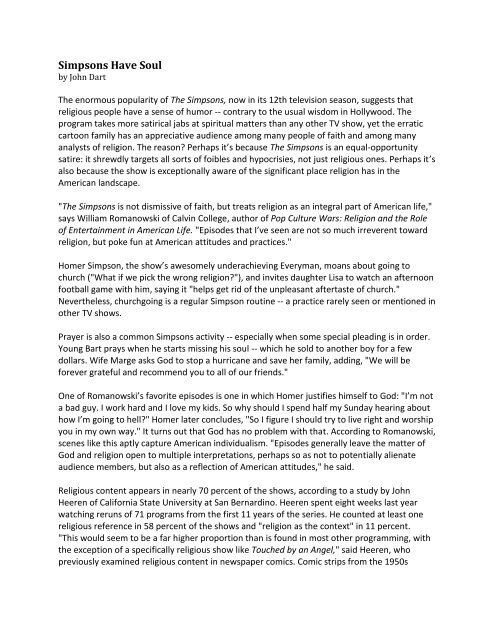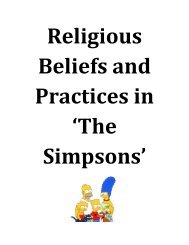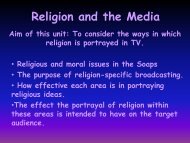Create successful ePaper yourself
Turn your PDF publications into a flip-book with our unique Google optimized e-Paper software.
<strong>Simpsons</strong> <strong>Have</strong> <strong>Soul</strong><br />
by <strong>John</strong> <strong>Dart</strong><br />
The enormous popularity of The <strong>Simpsons</strong>, now in its 12th television season, suggests that<br />
religious people have a sense of humor -- contrary to the usual wisdom in Hollywood. The<br />
program takes more satirical jabs at spiritual matters than any other TV show, yet the erratic<br />
cartoon family has an appreciative audience among many people of faith and among many<br />
analysts of religion. The reason? Perhaps it’s because The <strong>Simpsons</strong> is an equal-opportunity<br />
satire: it shrewdly targets all sorts of foibles and hypocrisies, not just religious ones. Perhaps it’s<br />
also because the show is exceptionally aware of the significant place religion has in the<br />
American landscape.<br />
"The <strong>Simpsons</strong> is not dismissive of faith, but treats religion as an integral part of American life,"<br />
says William Romanowski of Calvin College, author of Pop Culture Wars: Religion and the Role<br />
of Entertainment in American Life. "Episodes that I’ve seen are not so much irreverent toward<br />
religion, but poke fun at American attitudes and practices."<br />
Homer Simpson, the show’s awesomely underachieving Everyman, moans about going to<br />
church ("What if we pick the wrong religion?"), and invites daughter Lisa to watch an afternoon<br />
football game with him, saying it "helps get rid of the unpleasant aftertaste of church."<br />
Nevertheless, churchgoing is a regular Simpson routine -- a practice rarely seen or mentioned in<br />
other TV shows.<br />
Prayer is also a common <strong>Simpsons</strong> activity -- especially when some special pleading is in order.<br />
Young Bart prays when he starts missing his soul -- which he sold to another boy for a few<br />
dollars. Wife Marge asks God to stop a hurricane and save her family, adding, "We will be<br />
forever grateful and recommend you to all of our friends."<br />
One of Romanowski’s favorite episodes is one in which Homer justifies himself to God: "I’m not<br />
a bad guy. I work hard and I love my kids. So why should I spend half my Sunday hearing about<br />
how I’m going to hell?" Homer later concludes, "So I figure I should try to live right and worship<br />
you in my own way." It turns out that God has no problem with that. According to Romanowski,<br />
scenes like this aptly capture American individualism. "Episodes generally leave the matter of<br />
God and religion open to multiple interpretations, perhaps so as not to potentially alienate<br />
audience members, but also as a reflection of American attitudes," he said.<br />
Religious content appears in nearly 70 percent of the shows, according to a study by <strong>John</strong><br />
Heeren of California State University at San Bernardino. Heeren spent eight weeks last year<br />
watching reruns of 71 programs from the first 11 years of the series. He counted at least one<br />
religious reference in 58 percent of the shows and "religion as the context" in 11 percent.<br />
"This would seem to be a far higher proportion than is found in most other programming, with<br />
the exception of a specifically religious show like Touched by an Angel," said Heeren, who<br />
previously examined religious content in newspaper comics. Comic strips from the 1950s
through the 1980s took an increasingly secular attitude toward religious symbols, Heeren said,<br />
whereas The <strong>Simpsons</strong> displays a "much greater freedom in the lampooning of these symbols."<br />
In the world of the <strong>Simpsons</strong>, God is omnipotent, capricious and responsive. After Homer and<br />
another man compete as snowplowers, then form a common enterprise, Homer is moved to<br />
proclaim,<br />
"When two best friends work together, not even God can stop them." From the heavens a voice<br />
is heard, "Oh, no?" and rays of sunlight rapidly melt all the snow.<br />
Wanting to repay God for saving him from a fire, Homer prays, "Oh, spiteful one, show me who<br />
to smite and they shall be smoten." When Homer asks God the meaning of life, God tells Homer<br />
he has to wait until he dies to find out. Homer says he can’t wait that long, and the deity quips,<br />
"Can’t wait six months?"<br />
Two regular characters help keep the religious themes spinning: Ned Flanders is the hypercheerful<br />
evangelical next door, and the Reverend Timothy Lovejoy is the smarmy, amorphously<br />
Protestant pastor of the First Church of Springfield.<br />
Even God agrees with Homer that Lovejoy’s sermons are boring, Heeren points out. Confessing<br />
that the pastor "really displeases me," God says, "I think I’ll give him a canker sore."<br />
Some of The <strong>Simpsons</strong> church humor is a mild sort, typical of an earlier era of churchgoing<br />
about sleep-inducing sermons or tactics to elicit more money in the offering ("And as we pass<br />
the collection plate, please give as if the person next to you was watching," Lovejoy intones).<br />
But most of the satire is culturally savvy in the extreme, with a sharp critical edge. For example,<br />
the sign outside First Church of Springfield reads at various times "God, the Original Love<br />
Connection," or "Today’s Topic: He Knows What You Did Last Summer," or "Private Wedding:<br />
Please Worship Elsewhere" or "God Welcomes His Victims."<br />
Religious satire abounds in an episode on the Movementarians, a sect that temporarily seduces<br />
most of the Simpson family. Lovejoy takes on the sect in his sermon: "This so-called new<br />
religion is nothing but a pack of weird rituals and chants designed to take away the money of<br />
fools. Let us say the Lord’s Prayer 40 times, but first let’s pass the collection plate." When the<br />
plate returns nearly empty, the pastor starts pouring gasoline on the church floor, lamenting, "I<br />
never thought I’d have to do this again."<br />
Upon departing Springfield, the sect leader takes off in a shiny spaceship. An astonished<br />
Lovejoy gasps, "Oh mercy, he’s the real deal!" The minister rips off his clergy collar, throws it on<br />
the ground and stomps on it. Seconds later, the flimsy spaceship falls apart and crashes.<br />
Lovejoy spots his collar: "How did that get down there?"<br />
Lovejoy appears on a hip Sunday evening radio program called Gabbin’ with God with Catholic<br />
and Jewish representatives. But as Heeren points out, the pastor’s religious knowledge and<br />
tolerance have definite limits. When Marge asks Lovejoy if he will conduct last rites for gravely<br />
ill Grandpa Simpson he replies, "That’s Catholic, Marge. You might as well ask me to do a<br />
voodoo dance."
In another episode, when Lovejoy is citing the various religious traditions of the neighbors who<br />
saved Homer’s life, the minister pauses in the case of Apu, the Indian who runs the Kwik-E-<br />
Mart. He finally labels him "miscellaneous. Apu objects, saying he is Hindu, and that "there are<br />
700 million of us." Lovejoy says soothingly, "Ah, that’s super."<br />
In the mid-1990s, when some <strong>Simpsons</strong> episodes made fun of a sculpture of Ganesha, the<br />
popular elephant deity in the Hindu pantheon, some southern California Hindus objected.<br />
Prithvi Raj Singh, president of the Federation of Hindu Associations, said a Fox Television<br />
spokeswoman returned his call. "She said it was not a planned attack on Hinduism," Singh said.<br />
"‘The show treats other religions humorously too,’ she said." The explanation was accepted and<br />
the matter was dropped.<br />
Fox did not so easily placate the media-savvy Catholic League for Religious and Civil Rights. The<br />
New York-based Catholic League raised its eyebrows at a 1998 episode featuring this exchange<br />
in the <strong>Simpsons</strong>’ car while driving home from a church service:<br />
Bart: "I’m starving. Mom, can we go Catholic so we can get communion wafers and booze?"<br />
Mom: "No, no one is going Catholic." Three children is enough, thank you."<br />
Thomas Chavez , Fox’s manager for broadcast standards and practices, wrote to the Catholic<br />
League, saying in part that Bart, like many unknowing children, "sees the wafer merely as food<br />
and wine as a forbidden drink." He said that Marge’s response " may be perceived as short and<br />
curt," but that she was responding by "stating why she would not be comfortable converting to<br />
Catholicism."<br />
On January 31, 1999, an episode that followed Fox’s broadcast of the Super Bowl showed a gas<br />
station scene in which a trio of buxom, scantily clad women greet a driver. One of the women<br />
bends over to reveal a large cross, then says, "The Catholic Church -- we’ve made a few<br />
changes." This prompted the Catholic League to organize more protests.<br />
Deluged with angry letters, Fox directed writers to lay off Catholics, according to Los Angeles<br />
Times television critic Howard Rosenberg. He reported that Mike Scully, executive producer of<br />
The <strong>Simpsons</strong>, complained bitterly about the directive, but was told that any future episodes<br />
containing offensive lines should not be attributed to Catholics. Scully was told it was OK to<br />
target "Methodists, Presbyterians or Baptists," but not Catholics. When the program appeared<br />
as a rerun in May, the reference to the Catholic Church was changed to "the church."<br />
Conservative evangelicals have generally either seen the positive side of the show or taken a<br />
live-and-let-live stance. A 1992 master’s thesis at Pat Robertson’s Regent University<br />
complimented the program. "While it may not completely resonate with the evangelical Judeo-<br />
Christian belief system, The <strong>Simpsons</strong> does portray a family searching for moral and theological<br />
ideals," wrote Beth Keller.<br />
Her favorable comments and others’ were cited in a 1999 article in the Orlando Sentinel by<br />
religion writer Mark Pinsky. His The Gospel According to The <strong>Simpsons</strong>: The Spiritual Life of
America’s Most Animated Family will be published late this year by Westminster <strong>John</strong> Knox<br />
Press. Pinsky quoted the conservative Family Research Council’s Robert Knight, who noted that<br />
the <strong>Simpsons</strong> do function in a moral universe in which "evil often -- if not always -- is punished<br />
with consequences." PRISM, the monthly published by Evangelicals for Social Action, has called<br />
the series "the most pro-family, God-preoccupied, home-based program on television."<br />
The main characters and the show’s concepts were created by cartoonist Matt Groening.<br />
Groening has said that with The <strong>Simpsons</strong> on the air, "right-wingers" should not complain about<br />
God not being on television. Not only does the Simpson family speak to God, "we show Him,<br />
and God has five fingers -- unlike the <strong>Simpsons</strong>, who have only four," he told Mother Jones<br />
magazine. Groening told The <strong>Simpsons</strong> Archives Web site (www.snpp.com) last year that the<br />
program’s "Krusty the Clown" is based on a real TV "Christian clown" he watched as a kid in<br />
Portland, Oregon.<br />
Fans of the show note that Marge is rock-solid faithful, so much so that she once detained<br />
Jehovah’s Witnesses longer than they wanted to stay. Lisa, only eight, is spiritually wise beyond<br />
her years.<br />
Most of the religious content of the series comes from George Meyer, "who is generally<br />
considered a mad genius, with emphasis on ‘mad,"’ said Steve Tompkins, former writer for the<br />
show, who spoke to a seminar last fall at Fuller Theological Seminary in Pasadena, California.<br />
Like many of the writer-producers who have worked on the program, Tompkins said, he once<br />
was associated with the Harvard Lampoon magazine.<br />
Tompkins was with the show in its sixth, seventh and eighth seasons -- the last one being 1996-<br />
97 when he was listed as a co-producer with Meyer and Scully. Tompkins then left to become<br />
executive producer for PJ’s, a claymation program created by actor Eddie Murphy.<br />
Simpson writers "were atheist Jews or atheist Christians, and only two of us were churchgoing<br />
Christians when I was there," said Tompkins. Yet, despite the frequent focus on religion, "there<br />
is no agenda one way or another," Tompkins said. "It’s all about the joke." Other writers want<br />
the story line to be true to the character, and still others seek "an omnidirectional assault on<br />
anything that is sacred -- hypocrisy will be mocked at all times," he said.<br />
Asked how he and other writers view the show’s two main foils for religion, Tompkins said,<br />
"Lovejoy is pretty much a pan-denominational windbag." As for nerdy Ned Flanders, "there is a<br />
lot of affection for him . . . even though he is often the object of humor and annoyance."<br />
In a well-remembered episode, Flanders saves Homer from a house fire, an act of love and<br />
courage which rekindles Homer’s faith. Lisa declares, "This is truly an act of God." Homer<br />
doubts it -- the house of faithful Ned Flanders is now engulfed in flames. But just then a<br />
cloudburst puts out the fire and a rainbow appears.<br />
A Christian Science Monitor writer last year opined that The <strong>Simpsons</strong> has lasted so long<br />
because, for all their manifest flaws, "the <strong>Simpsons</strong> love each other." And no matter how
acerbically the writers skewer human pretensions and social ills, "there’s a kindly spirit about<br />
the show," wrote M. S. Mason. Or as Tompkins observed, "Somehow there is goodness at the<br />
end" of every show.

















